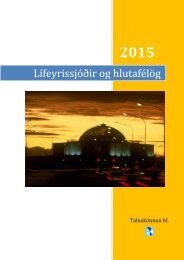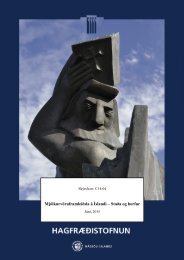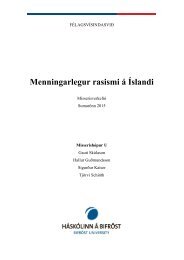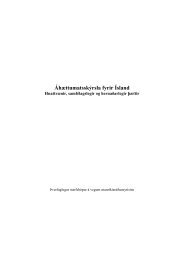You also want an ePaper? Increase the reach of your titles
YUMPU automatically turns print PDFs into web optimized ePapers that Google loves.
WORLD REPORT 2016<br />
HUMAN RIGHTS WATCH<br />
cluding mass surveillance, beyond the formidable array of tools that they already<br />
deploy.<br />
In the US, CIA Director John Brennan used the Paris attacks to decry recent technical<br />
and legal restrictions on intelligence agencies’ ability to engage in the<br />
mass collection of phone metadata, even though those restrictions are modest<br />
given the scope of mass surveillance revealed in 2013 by former National Security<br />
Agency contractor Edward Snowden. Moreover, two independent oversight<br />
bodies with access to classified information concluded that such metadata had<br />
not been essential to foiling a single terrorist plot, despite the enormous invasion<br />
of privacy involved in scooping up these often-intimate details of modern<br />
life.<br />
FBI Director James Comey also used the Paris attacks to revive efforts to require<br />
Internet companies to include “back doors” to the strongest forms of encryption<br />
they use. Companies have strived to build more secure systems following public<br />
dismay at Snowden’s revelations. But there is no back door that only the good<br />
guys can exploit. Criminals would inevitably have a field day, endangering critical<br />
infrastructure and the sensitive communications of ordinary users. And the<br />
terrorists will inevitably find their own encryption methods even if not from the<br />
mass market.<br />
Some European officials, too, appear tempted to increase mass surveillance.<br />
France adopted a new intelligence law that bolstered mass surveillance powers.<br />
The United Kingdom is in the process of doing the same. Yet the perpetrators in a<br />
number of attacks in Europe have included people who were known to police but<br />
not pursued due to lack of police resources.<br />
French President François Hollande seemed to recognize this problem by promising<br />
to add 8,500 more law enforcement officers to pursue leads, rather than simply<br />
accumulating more mass data without the means to follow up. Still, after the<br />
Paris attacks France also embraced potentially indiscriminate policing techniques,<br />
with its president declaring a state of emergency that allows security<br />
forces to conduct warrantless searches and arrests. The lack of court oversight<br />
makes profiling all the more likely—in this case of young Muslim men. Police<br />
stops based on such profiling have long plagued the very populations that<br />
should be cultivated to help counter violence.<br />
Civil Society Empowered by Social Media<br />
While Europe and the US worry about the nexus of refugees and terrorism, political<br />
and economic pressures have led authoritarian governments to fret about the<br />
combination of civil society and social media.<br />
A vigorous civil society helps to ensure that governments serve their people. Isolated<br />
individuals find it difficult to speak loudly enough to be heard. Joining together<br />
in civic groups amplifies their voices and leverages their ability to<br />
influence governments. Civil society—the nongovernmental groups and associations<br />
that enable people to band together on matters of mutual concern—is an<br />
essential part of any democracy worth its name. Independent and vigorous civic<br />
groups help to guarantee that governments build schools, ensure access to<br />
health care, protect the environment, and take countless other steps to pursue<br />
their vision of the common good.<br />
Yet some officials see popular input not as a guide to policy, but as a threat.<br />
When leaders are primarily interested in advancing themselves, their families, or<br />
their cronies, the last thing they want is an empowered public, able to link together<br />
and combine resources to investigate, publicize, protest, and rectify government<br />
corruption, malfeasance, or incompetence.<br />
In a different era, autocrats might have dispensed with any pretense of democratic<br />
rule, but these days at least a facade of democracy is often a prerequisite<br />
for legitimacy. Yet just as authoritarian rulers have learned to manipulate elections<br />
to ensure their political longevity, so they are now working between elections<br />
to prevent an empowered public from impeding their authoritarian aims.<br />
By closing the political space in which civic groups operate, autocrats are trying<br />
to suck the oxygen from organized efforts to challenge or even criticize their selfserving<br />
reign.<br />
In recent years, social media have made this competition between state and society<br />
more free-wheeling and volatile. Until recently, civil society had to work<br />
through traditional media to make its voice heard widely. The finite number of<br />
traditional media outlets in any country made censorship easier.<br />
Today, the rise of social media, especially when readily available on mobile devices,<br />
means that people can bypass traditional media and speak to large num-<br />
6<br />
7










